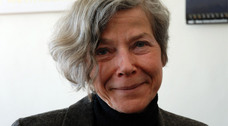2008-05-20

When Douglas researcher Ellen Corin, PhD, moved from Belgium to Montréal in 1978, she was initially impressed with Montréalers' tolerance towards marginalized people, including the mentally ill.
But over time she realized that, often, it was not tolerance. It was indifference.
"I decided to use my anthropological expertise to help people gain understanding and compassion for those with mental illness. I've spent the last quarter century working towards that goal. I've also dedicated my career to ensuring that the needs and desires of people with mental illness are met and respected."
Rejects "Cookie-Cutter" Solutions
A researcher in the Douglas Research Centre's Services, Policy, and Population Health Research Theme, Ellen has made impressive inroads in helping people live successful lives, despite their mental illness. She combats stigma by helping society see mentally ill people as people first - calling for greater understanding of the challenges faced by people with mental health problems, as they strive to deal with their problems.
Here's an example of her efforts: She's currently helping the community group Les Impatients prepare to host an art exhibit in September. This exhibit will showcase works by artists with and without mental illness. Topics will include death, sexuality, and violence. "All things that are part of our common human experience," explains Ellen.
Visitors will not be told which of the artists have a mental illness - promoting the message that their identity is composed of much more than their mental illness. According to Ellen, "This event will create an opportunity for dialogue between people with mental health problems, the artistic community, and the public."
Ellen also led the scientific committee for the March 2007 conference "Stigma and Mental Illness: A Vicious Circle", which was held at the Douglas and gave a voice to patients, relatives, practitioners and researchers, and successfully raised awareness of ways to combat stigma within the medical profession and society in general.
"Fit the Person"
In recent years, Ellen has also developed strong ties with Regroupement des ressources alternatives en santé mentale du Québec (RRASMQ) - a patient rights organization representing over 100 community groups. Currently, she is conducting a research project, in collaboration with a subgroup within RRASMQ, to pinpoint effective alternative approaches to conventional psychiatric treatment. The results should improve 1st-line interventions and programs, in keeping with Mental Health Action Plan goals.
Ellen firmly rejects "cookie-cutter" solutions - programs for the mentally ill that try to squeeze people into rigid requirements. Instead, she favours building solutions around individual needs, desires, and life strategies.
She stresses that the latest research supports her view, "Programs that focus on what affected people know they want and need are more successful than those that try to make the person fit the system."
Humility, Please
Ellen encourages the conventional and the alternative psychiatric communities to acknowledge that there are still many unanswered questions about mental illness. "Psychosis, for example, remains an enigma," she explains. "We must be humble and negotiate a place where our expertise and patients' experiences can meet, if we are to offer them lasting and meaningful support. By being humble and focussing on recovery, we model behaviour that helps to decrease stigma in both the medical and general community."
Many Countries
Ellen was born and educated in Belgium. Her university studies in psychology were deeply influenced by the fields of anthropology, sociology, and philosophy.
This, in turn, kindled an interest in the impact of society on mental health and illness. Ellen's fascination with cultural influences in mental health has taken her to many countries. From 1966 to 1978, she studied a number of ethnic communities in Zaire (Democratic Republic of the Congo), learning and assessing their traditional treatments of mental illness. Currently, she is conducting research in India, studying patients with schizophrenia who are treated by the Schizophrenia Research Foundation, and patients who go to religious temples for support and relief of their symptoms.
In addition, Ellen is conducting a study with Hindu ascetics in India. The results of this study are increasing her understanding of how particular aspects of Hinduism may help fragile people, including patients with schizophrenia, deal with some of their challenges.
"There are many ways to decrease stigma," she concludes, "but two things are constant. We must remain open to new ideas and always, always, put the patient first."
In a Word or Two.
What word best describes mental illness?
A deeply-human, destabilizing experience
What film has most influenced your thoughts on mental health?
15 Park Avenue, a movie from India
How do you maintain a balanced lifestyle?
I discuss my work with my husband, who shares my interests, and attend contemporary art performances.
Who is doing outstanding work in destigmatizing mental illness?
Lorraine Guay, a nurse who has dedicated her career to defending the rights of marginalized people in our society
One word that describes the Douglas?
Conciliating


